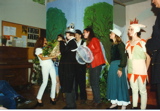First
I would like to introduce myself to you, by telling you how it all
started...
During my study Art Education in Holland I started a drama course. At
that time I was 22. The children and parents were very enthousiastic.
The organisation asked me
to work for them. And that was the beginning. I finished my study and
worked as a drama teacher.
*****************************************************************************
I give drama lessons to children between 5 and 15 years old, in
different groups.
Younger
children (5-7)
I tell them little stories, that we then play out together. We also do
drama games and drama without words (mime) is also very popular. For
example, they all play a flower and one child walks in the room with a
made up watering-can. Every time a flower does not get enough water,
the flower will slowley go down. When a flower gets water, it will go
up again. Without them knowing they will learn the basics of drama. But
more important, they learn to work together and to solve problems. The
creative proces is a very magic thing that becomes visible to parents
when they are watching their children at the presentation.
Older children
(8-12)
I let them devise their own stories, usually
guided by a theme or a new drama technique that I introduce.
They get to work in small groups, and show their results to each
other. I also learn them to give feedback to each other. I like to vary
the drama lessons with all kinds of drama. Not only traditional drama
(playing a story), but also playing with music, mime and other
abstract drama activities. For example, the children make a mime play
by a part of music. Another example: I let them get experience in
making a story that has a happy end and an unhappy end.
Oldest
children (11-15)
With the older children I make bigger presentations, like Shakespeare's
"Midsummer Night's Dream". Those children like to have more influence
over their presentation. For example by making their own backgrounds
and costumes. The older children are also able to learn more text for a
presentation. Usually, I prefer to make a script myself where they can
fill in any role they like to play. Together we work out the details.
The result becomes theirs.
After a year other organisations, in other cities nearby, asked me to
give drama classes at their location. So I worked in Driebergen, Maarn,
Hilversum, Blaricum and Huizen and did other projects in different
cities.
*****************************************************************************
After
being a drama teacher for six years, I became a primary school teacher.
But I still gave drama lessons as an after school activity. I also
directed the musicals given by the oldest children to their family. I
also did numerous drama workshops at weddings and art festivals.
*****************************************************************************
The children learn new drama techniques, for example:
- Role play is the basis of all dramatic
activity. The ability to
suspend
disbelief by stepping into another character's shoes comes quite
naturally to most children. Through the structure of the drama lesson
this can be used to great effect, challenging children to develop a
more sensitive understanding of a variety of viewpoints whilst
sharpening their language and movement skills. By adopting a role,
children can step into the past or future and travel to any location,
dealing with issues on moral and intellectual levels.
- With
freeze-frame,
the action in a play or scene is frozen, as in a photograph or video
frame. Still images, on the other hand, require individuals or groups
to invent shapes or postures. Groups can be asked to tell a story
through a series of prepared still-images. The still images can also be
brought to life through improvisation.
- With
flashbacks
performers in a scene are asked to improvise scenes or incidents which
take place seconds, minutes, days or years before or after a dramatic
moment. This enables the exploration of characters' backgrounds,
motivations and the consequences of their actions. The technique can be
combined with image theatre or still images.
- With
hot
seating a character is questioned by the group about his or her
background, behaviour and motivation. The method may be used for
developing a role in the drama lesson or rehearsals, or analysing a
play post-performance. Even done without preparation, it is an
excellent way of fleshing out a character. Characters may be hot-seated
individually, in pairs or small groups. The technique is additionally
useful for developing questioning skills with the rest of the group.
Drama
games are also part of every lesson, for example:
- A
great exercise for encouraging group sensitivity. Everybody finds a
space in the room. On a given signal, everyone starts walking, using
all the space in the room. On a second signal, everybody stops. Now,
that was easy. This time, without talking, everybody must decide to
start walking at the same time - and then to stop as a group at the
same time. This obviously will require some practice! With sensitivity,
it can be done. It is worth spending time on.
- In
small groups. The name of an object is called out and the group has to
make the shape of that object out of their own body shapes, while the
leader counts down slowly from ten to zero. Usually every group will
find a different way of forming the object. Examples could be: a car, a
ship, a washing machine, a fire, a clock - anything you like.
You could choose objects from a play you are rehearsing or a theme you
are exploring. Groups can also be given a few minutes to devise two
objects of their own which the rest of the class try to guess.
- Stand
in a circle. The first person (A) starts miming an activity, such as
eating an apple. The person to their left (B) says "What are you
doing?". A keeps miming and at the same time says the name of a
different activity. For example, if A was miming eating an apple, they
could say "playing the piano". B then starts playing a piano. A stops
their mime. Now the third person (C) asks B , "What are you doing?". B
keeps playing the piano and names a different activity, which C must
mime. And so it goes on..
- In
pairs, create two frozen images where one partner has a higher status
than the other. In the first, the gap between each status should be
exaggerated. In the second, it should be more subtle, but still
visible. Show some examples and ask members of the group to guess which
partner has the higher status, indicating ways in which posture and
facial expressions are used by high and low status characters.
Of
course there are a lot more drama techniques & drama
games!
|
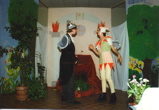
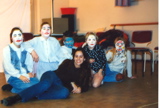
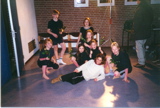
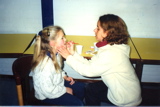
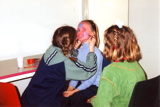
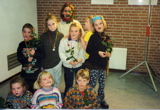
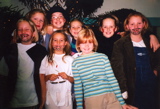
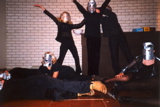
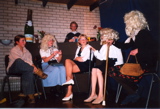
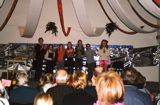
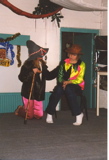
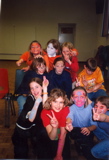
|
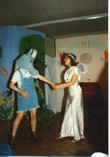 Cost:
Cost:
